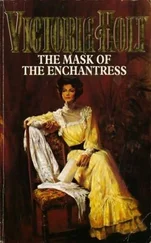My maternal grandmother, the Duchess of Saxe-Coburg-Saalfeld, referred to me as the May Blossom, which I thought rather charming when I heard it. “The English like queens,” she added, “and the niece— and also the first cousin—of the ever-lamented and beloved Charlotte will be most dear to them.” It was true that the English had liked queens ever since the reign of Elizabeth. How the people had revered that one! The greatest monarch ever to sit on the throne, some said—and a woman! Yes, after Elizabeth, the English must like queens.
There was a great deal of controversy about my name and that ended with a scene in the Cupola Room.
My uncle, the Regent, had taken a great dislike to my mother—so had Uncle William. Feodore told me that our mother said it was because she was young and healthy, and they, poor things, were decrepit old gentlemen who had no hope of getting healthy children. The Regent even hated the way my mother dressed. She loved feathers and rustling silks and lots of flounces, which the Regent said was Bad Taste. He was known throughout the kingdom, in spite of all his failings, as the arbiter of Good Taste. I have never known much about that, noticing that people are apt to believe that what they like is good taste and that all those who have different opinions have bad. However, that dislike was there and my mother—such a forceful lady—would always feel that there was something very wrong with those who criticized her.
There had, so Feodore told me, been a great deal of trouble about choosing my names. My father was so sure that I was going to be a queen that it was imperative that I should have a name suitable for one. After a great deal of thought it was decided that my first name should be Georgiana. There had been three Georges and likely to be a fourth, so that seemed the best choice. This was to be followed by Charlotte (after the Princess who had made this possible), Augusta Alexandrina (after the Tsar), and Victoria after my mother.
Etiquette, of course, demanded that the names be submitted to the Regent for his approval. My mother had argued, so said Feodore. “Why all this fuss about a name?” One might have asked the same of her. Of course my name was important and I have no doubt that the Regent regarded me with suspicion. After all, when one holds a position, it is not the most pleasant thing in the world to view one's successor. There is a feeling of being edged toward the grave. All monarchs feel it at some time—and particularly when one is obese, overcome with gout and other ailments, desperately trying to appear young and handsome as one has been in one's youth.
My parents knew that there would be trouble because on the very evening before the ceremony he sent a brief note saying that the name of Georgiana could not be placed before that of the Emperor of Russia; and he could not allow it to follow.
I am sorry that I cannot recall that scene from personal experience— although I was at the center of it. The Cupola Room must have looked very grand with the golden font that had been brought from the Tower and the crimson velvet curtains that had come from the chapel in St. James's. I had three distinguished sponsors, the most important of these being Alexander the First, the Tsar of Russia; the second was my Aunt Charlotte, the Queen of Württemberg (who had been the Princess Royal of England); and the third my maternal grandmother, the Duchess of Saxe-Coburg-Saalfeld. These illustrious sponsors were not present in person, of course, but were represented by my uncle, the Duke of York, and my aunts, the Princess Augusta and the Duchess of Gloucester.
The Prince Regent at length arrived and from that moment there was trouble. I can imagine the animosity that must have flashed between him and my mother. There we were assembled in that splendid room before the golden font, my mother preparing for battle. Many times have I seen her in the mood she must have been in on that occasion.
The Archbishop held me in his arms waiting. He asked the Regent to announce my first name.
“Alexandrina,” he said, and then he paused.
The Archbishop was waiting.
“Charlotte,” whispered my father.
But the Regent shook his head reproachfully to show definite disapproval.
“Augusta?”
“Indeed not,” said the Regent. “Let her be named after her mother. Alexandrina Victoria.”
So, to the fury of my mother and the consternation of my father, I, who was to have emerged from the Cupola Room enriched by so many grand names suited to a future queen, came out with only two.
The Regent had shown his disapproval of what he called my parents' presumption. He was not dead yet, and he clearly hoped that one of his other brothers would provide the heir to the throne, for his animosity toward my frilled and feathered mother—as I believe he called her—was great.
And there I was—“plump as a partridge”—full of lusty health and ready to start my life—a possible heir to the throne.
* * *
WE WERE VERY poor. My father had many debts. Indeed, the hope of getting these settled was one of the reasons for his marriage—a secondary one, it is true, but nonetheless a reason. He was apparently disappointed in his hopes in that direction and the need for economy was urgent.
As was to be expected, Uncle Leopold— dear Uncle Leopold—came to the rescue. Uncle Leopold, who was to mean so much to me, was my mother's brother—and he it was who had been the devoted husband of Princess Charlotte. He had won her affections so wholeheartedly and kept her in restraint so admirably that he had become a person of some standing in England, although he was no favorite of the Prince Regent and Uncle William. Uncle Leopold was abstemious, careful, so right in everything he did, and people of less moral rectitude are inclined to dislike such people, I suppose because they bring home to them too forcibly their own shortcomings. One of the accusations Uncle William brought against Uncle Leopold was that he did not drink wine at dinner. He was quite angry about it and on one occasion said severely, “Sir, gentlemen do not drink water at my table.” Some might have been cowed but Uncle Leopold was quite unperturbed and went on drinking water.
However, Uncle Leopold had retained Claremont, where he had lived in such amity with Princess Charlotte, and because we were in such financial difficulties he lent us the house. So to Claremont we came.
When I grew older I came to love my visits to Claremont dearly. It was small as royal residences go, but Uncle Leopold told me once how delighted Charlotte had been when she had first come to it. She had said it was the perfect setting for married lovers for they could shut themselves away from the fashionable world and live there simply. I loved it, partly for itself, partly because it was Uncle Leopold's and I loved everything about him. Looking back over a great many years, I see that he was the first man to win that devotion which I was so eager to give. I think now that it was because I needed a man in my life to be all important to me, a father when I was a child, a husband later. He had to be there, because although I was most imperious, so certain of my destiny, which was to rule, in a way I wanted to be ruled—and thus it ever was. How strange people are, and how little we know ourselves. But when one looks back in serenity tempered by sorrow and perhaps wisdom gleaned over the years, one sees so much that one missed before.
So to Claremont we went—Claremont with its thirteen steps to the entrance. I always counted them when I ran up eager to be greeted by Uncle Leopold. I loved the Corinthian pillars that held up the pediment, and it thrilled me to enter the large rooms on the ground floor. There were eight of them, I remembered. Uncle Leopold used to take me through them and talk of what he and Charlotte had done and said to each other; and we would mingle our tears, for Uncle Leopold cried easily, which I always felt showed deep sensitivity in a man.
Читать дальше









